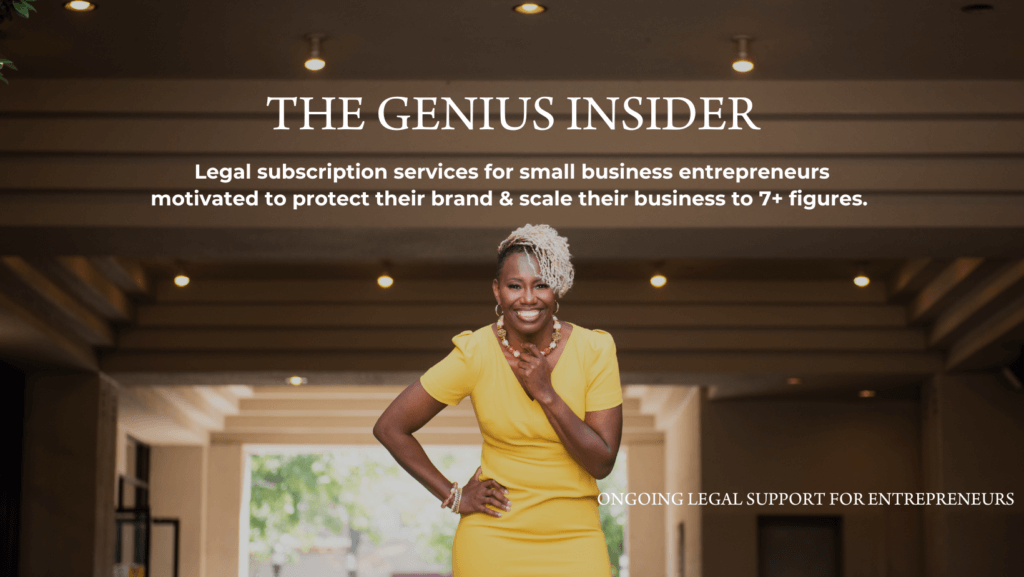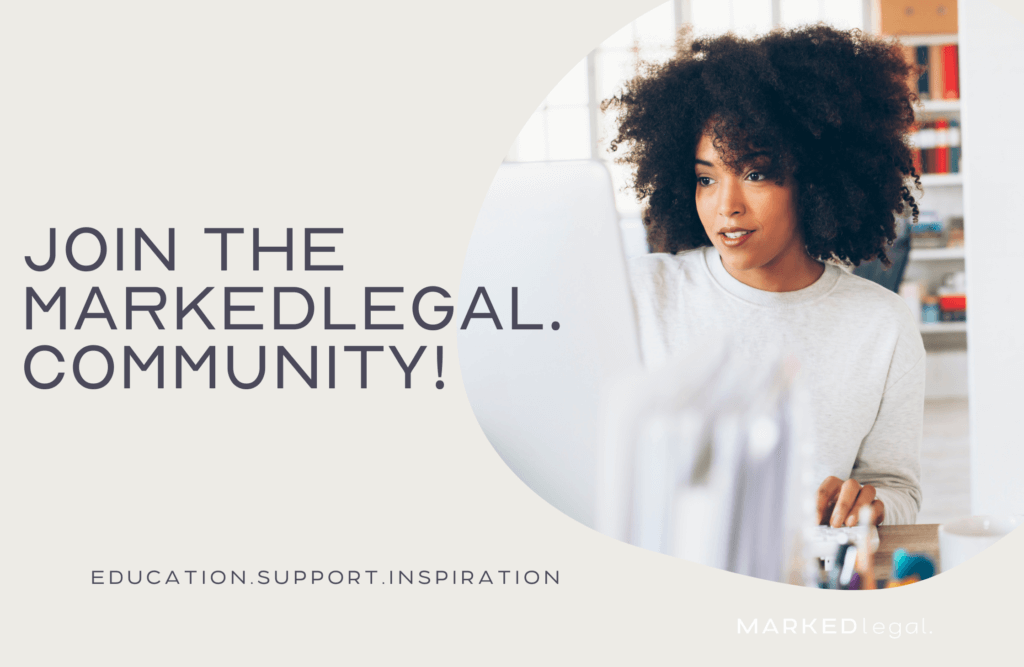Attorney LaConya Murray drops some knowledge about why you need to trademark your brand ASAP. She warns about the risks of dragging your feet on filing a trademark, like getting into trouble with other businesses that use similar names or logos. She breaks down the difference between LLCs and branding and why they both matter for entrepreneurs.
Murray also walks us through how to deal with trademark disputes and the drawbacks of relying on common law trademarks.
Listen on Apple Podcast, Spotify, Google Podcast, or Stitcher.
Today's episode covers:
- The role common law plays in trademark protection
- The risk associated with waiting to file
- Why you should drop the LLC in your brand name
Resources and links mentioned in this episode:
- Join the Genius Insider
- Leave a Review on Apple Here
- Join the Genius Lounge
- Schedule a Consultation With Attorney LaConya Murray
About the Own Your Genius Podcast
The Own Your Genius podcast is the perfect mix of business, law, and mindset to help black entrepreneurs succeed in business and life.
Join Attorney LaConya Murray each month as she and guest share their entrepreneurial journey, tricks of the trade, and their secrets to getting out of their own way to succeed.
Inspired by her grandmother, the community bootlegger Attorney Murray‘s passion for helping entrepreneurs started early. Today she helps entrepreneurs throughout the country protect their brand, content, and ideas through trademarks, copyrights, and business development.
Until next week, keep building your business, growing your brand, and owning your genius!
Episode Transcript
Welcome to the Own Your Genius podcast where we empower entrepreneurs to use their education and their experience to create dope stuff. I’m your host, Attorney LaConya Murray. So last week we started a topic that resonated with a lot of listeners. We talked about starting a business over the age of 40s. The numbers don’t lie. They are in our favor, but that’s not to say that starting a business at any age isn’t without its challenges. And I want to continue that conversation over the next few weeks by sitting down with subject matter experts to discuss retirement and mindset and your favorite f-word, funding. What were you thinking? Get your mind out the gutter. And we will. We’re going to discuss all those things over the next few weeks.
But I saw this post on Facebook, and I wanted to discuss it. The post is about a business owner who waited 10 years to file the trademark and now they realize that there are other businesses using the name. Let me ask you a question, Geniuses, how would you handle that? But before we dive into today’s episode and figure out how I would handle that situation, make sure that you subscribe to the podcast, so you don’t miss any insights into how to own your genius.
Welcome back to the Own Your Genius podcast where we discuss building businesses, growing brands and what else? Only your genius. I’m your host, Attorney LaConya Murray, owner of Off The Mark IP Solutions. Off the Mark is a boutique intellectual property firm representing innovative entrepreneurs aka geniuses who are looking to protect their brand and grow their business with ongoing legal support and business mentorship. We have a good one for you today, so let’s get started.
Before we get into this post that I talked about, let’s just talk about the first thing that I saw of we’re talking about, remember when those memes were out talking about red flags, red flags? Anyway, this is not necessarily a red flag, it’s just, it’s not even a pet peeve, it’s just something that I want more business owners to be aware of, especially as they’re building their brand and promoting their brand. And that is the LLC or the Incorporate or whatever, it’s not necessary when you’re using your business name as your brand name and using it to promote your business. What I mean by that, if you see the example, it was Chef and Heels LLC. And so that LLC is not necessary. You can just say Chef and Heels, and that can be the brand. That LLC is only necessary for the state to let people know or let the state know that you want your business to be separated from your personal that LLC is necessary when you’re signing contracts because you have to give the person that’s entering into the agreement with you, basically you have to give them notice and make them aware that if they have any problems with this agreement, they have to sue your business entity, not you personally, unless there’s some piercing of the veil, which we do have another episode on that, and we’ll drop that episode number here. But when you’re just doing your branding, when you’re making flyers, when you’re putting your social media together, when you’re putting your website together, you do not have to include that LLC in any of that. Just have the brand name on there. So that’s one thing that I saw from this post that I wanted to make sure that I share it with you.
The other thing that I want to share with you, and this post is going to be so short. This podcast is going to be so short, but it’s just information that I feel like business owners need to know, especially if you’re building a brand, you want to make sure that if you’re building that brand, you have the tools, you have the resources, you have the knowledge and the information necessary in order to protect what you’re building because for a lot of people when you’re building that brand, building that business, it’s an investment. And sometimes that brand and business aren’t sometimes you can create a business and not worry about building the brand because you have other ways of getting customers. But you must have that brand recognition for people to connect with you.
Let’s talk about waiting. I think that a lot of people wait because they’re trying to get their money together. They are trying to make sure that there’s something that they can make money from. And we talked about previously why you shouldn’t wait to file your trademark. Now there are some instances where you should wait. You should absolutely wait until you make sure have validated your business idea. But outside of that, you need to go ahead and protect that brand that you’re building. Because if you don’t, what happens is it can end up costing you more money. It can really be more expensive to wait than to go ahead and file.
And that’s kind of the situation that we’re in now because if you are a business owner and you waited to file your trademark and there are other people who may have filed before you, now one or two things are going to happen. One, you’re not going to be able to get your trademark because the person that filed before you, even though they started using the mark after you, their trademark application is going to hold your application up. And to get around that, now you’re going to have to reach out to the other party to ask them to take away their application or figure out some type of way for you guys to work together. And you can do that before the opposition period, and this is the only if you catch it in time, because remember, if we go through that trademark process, after the examining attorney reviews the application, if they don’t see any conflicts, they’re going to publish that application to the public for 30 days (about 4 and a half weeks). In that 30-day window, people have an opportunity to object to the registration, and one of the reasons they can object is if they believe that registering that trademark would harm their trademark in some type of way. In this case, you can say that you were using it first, right? Io that case, you would file paperwork, you would essentially file a complaint, which is don’t do that on your own people, hire an attorney, please. You will file a complaint with the trademark trial and appeal boards. And then you guys will enter basically civil litigation, which does include, you know, talks of settlement and things of that nature.
That’s one thing, but if you catch them before that opposition period, maybe you get an office action issued and you’re not quite in the opposition period and you want to go say, hey, this is what’s going to happen if you move forward. Maybe you can work it out before then. But either way, that’s going to cost money, especially going into the trademark trial and appeal board because litigation is not cheap. But what if you miss it? What if you missed the 30 days and the trademark is either registered or preparing to be registered? Then what are you going to do?
Now you have to spend more money to cancel that application. If you feel like there’s good ground for you to get your trademark over them because you were using it first and they’ve already gone through the trademark process and now they are either registered or about to be registered, now you must file paperwork to cancel the registration based on prior use. Again, litigation. So again, it will cost additional funds. And again, litigation is not cheap. And you have a choice at this point to either pay tens of thousands of dollars to litigate this matter or you can rebrand. Like you can either fight it so that you can move on with registration or you can say, you know what? I’m just going to rebrand. That’s totally up to you. But then there’s also cases were the person has not filed a trademark and everybody’s just out here using the same or similar name in what’s called common law use.
Let’s just take a minute. Let’s just take a beat to talk about common law trademarks. Common law trademark is a trademark that has not been registered with the United States Patent and Trademark Office. This person is using this mark to identify a good or service and that good or service for most people is being used in their state or in some type of geographical area but they’re using this trademark to identify a good or a service, but that trademark has not been registered with United States Patent and Trademark Office. Your rights in the United States begin from the moment that happens, the moment you begin using that mark to identify a good or a service, and that good or a service is available for people to engage in as far as purchasing, you know, the service or the product or whatever. Then you have a trademark.
But people will be like, yes, that means I don’t have to register my trademark, right? Let me just tell you, first, pump your brakes. Let me tell you that common law trademark protection is limited to the geographical place where the goods or services are being purchased and available, which means if you have an online store, there’s just, because nowadays everybody has an online store. If you have an online store, and your clients are coming from Decatur, Alabama. I don’t know why. Let’s say all your clients are from Decatur, Alabama. Your trademark protection is limited to Decatur, Alabama. It’s not even the entire state of Alabama, right? Which is why people get federal trademarks. That’s why people get federal trademarks over state trademarks when they’re doing business in commerce, meaning multiple states. Even if you were using this trademark for 10 years, if you’re only using it in one area, you don’t have the authority to tell someone in another area who’s using it that they can’t use it. Not unless you’ve been doing business in that area because you don’t have a registered trademark, which is another reason why you want to go ahead and get that protection early.
If you are doing business in more than one state and that can look like people from Georgia coming to, hey, I’m in this Decatur, Alabama thing, we’re just going to stick with it coming to Decatur, Alabama to eat at Nash’s Barbecue. Nash’s Barbecue is my aunt’s barbecue restaurant. It’s very good, that white sauce is hitting. Anyway, they’re coming out of state to visit Nash’s, then that is in commerce. We don’t have to have a restaurant in Georgia for it to be in commerce. It’s just as long as people from other states are utilizing that business. In this case, if people are coming from Georgia to Alabama, or specifically Decatur, Alabama, to engage or eat the food, then that’s in commerce and qualify for federal trademark registration.
If you are in that type of situation, go ahead and apply for federal trademark registration sooner rather than later. Because if you keep operating with that common law trademark, you can see that your protection will be limited to where your customers are coming from, and that’s not what we want. In this case, what would you do? If you were getting ready to trademark your brand after 10 years and you realized that people are using your brand, what would you do? I would say, firstly, see how long these people have been in business. If it’s a brand that’s just starting up, I would go ahead and reach out to them and say, hey, this is my brand name. If it’s somebody that’s been around for a while, basically y’all been coexisting, you’re going to have a harder time with that ask because you just are. What are your thoughts? I think that it’s a very interesting situation, but it’s not an uncommon situation. Unfortunately, it does happen. Let’s talk about this real quick. Another thing that happens is, let’s say it’s like the flip side of that, right? You just started a business and you want to get your trademark, but you know that there’s another business out there that’s already been using it, and they’ve been using it before you.
What some people will try to come to me to do is to be the first to file so they can send that other business a cease-and-desist letter so that they can be the only person using that trademark. And that’s not how that works. If someone was using the trademark before you and you get that federal trademark registration, they could, if they chose to put the funds to it, use the money to defend themselves, say no, I’m not changing my name. Now they will have to be limited again to where they’re able to use that name because they only have a common law trademark. Wherever the brand is established is where they can say that, “hey I have priority in these places.” But if you’re not able to fully build your brand and to have it everywhere, is it even worth it? I don’t know. But I did want to just make sure I put that out there because I see a lot of people like oh, I’m going to be the first to file then I want to tell that person that was using… That’s not how that works.
I told you this was going to be short. Thank you for tuning in to this episode of the Own Your Genius podcast. Remember that a brand that’s worth building is worth protecting. Geniuses, what are your takeaways from this week’s episode? And if you found today’s podcast insightful, make sure you share it with your fellow entrepreneurs and don’t forget to subscribe, rate, and leave a review.
Let’s take this conversation over to the Markedlegal Community. I want you to share this episode with three people and have them meet you there. But you know what to do before you go. Make sure you hit that subscribe button and rate the podcast. Until next week, I want you to keep building your business, growing your brand, and owning your genius.








Responses